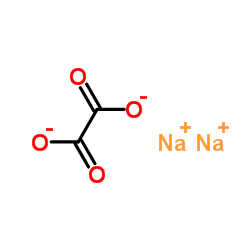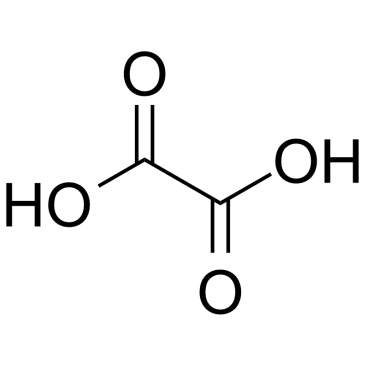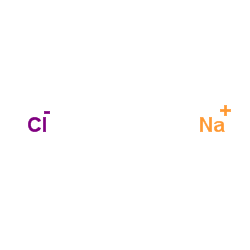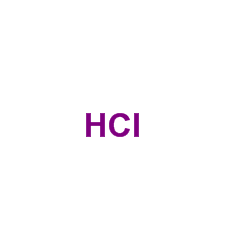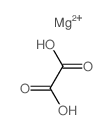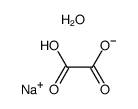1186-49-8
| Name | sodium,2-hydroxy-2-oxoacetate |
|---|---|
| Synonyms |
Monosodium oxalate
Sodium binoxalate Caswell No. 748 Ethanedioic acid,monosodium salt Sodium hydrogen oxalate EINECS 214-691-3 Natrium-Hydrooxalat |
| Boiling Point | 365.1ºC at 760mmHg |
|---|---|
| Molecular Formula | C2HNaO4 |
| Molecular Weight | 112.01700 |
| Flash Point | 188.8ºC |
| Exact Mass | 111.97700 |
| PSA | 77.43000 |
|
Section 1. Chemical Product and Company Identification Sodium binoxalateCatalog Common Name/ Number(s). Trade Name CAS#Not available. Manufacturer
RTECSNot available. SPECTRUM CHEMICAL MFG. CORP. TSCATSCA 8(b) inventory: No products were found. Commercial Name(s)Not available. CI# Not available. SynonymSodium Acid Oxalate IN CASE OF EMERGENCY Not available. Chemical Name Chemical FamilyNot available.CALL (310) 516-8000 NaHC2O4.H2O Chemical Formula SPECTRUM CHEMICAL MFG. CORP. Section 2.Composition and Information on Ingredients Exposure Limits TWA (mg/m3)STEL (mg/m3) CEIL (mg/m3) NameCAS #% by Weight 1) Sodium binoxalate100 Toxicological DataSodium binoxalate on IngredientsLD50: Not available. LC50: Not available. Section 3. Hazards Identification Potential Acute Health Effects Hazardous in case of skin contact (irritant), of eye contact (irritant), of ingestion, of inhalation. Slightly hazardous in case of skin contact (corrosive). Potential Chronic HealthCARCINOGENIC EFFECTS: Not available. EffectsMUTAGENIC EFFECTS: Not available. TERATOGENIC EFFECTS: Not available. DEVELOPMENTAL TOXICITY: Not available. Repeated or prolonged exposure is not known to aggravate medical condition. Sodium binoxalate Section 4. First Aid Measures Eye ContactCheck for and remove any contact lenses. Do not use an eye ointment. Seek medical attention. Skin ContactAfter contact with skin, wash immediately with plenty of water. Gently and thoroughly wash the contaminated skin with running water and non-abrasive soap. Be particularly careful to clean folds, crevices, creases and groin. Cover the irritated skin with an emollient. If irritation persists, seek medical attention. Serious Skin ContactWash with a disinfectant soap and cover the contaminated skin with an anti-bacterial cream. Seek medical attention. InhalationAllow the victim to rest in a well ventilated area. Seek immediate medical attention. Serious InhalationNot available. IngestionDo not induce vomiting. Loosen tight clothing such as a collar, tie, belt or waistband. If the victim is not breathing, perform mouth-to-mouth resuscitation. Seek immediate medical attention. Serious Ingestion Not available. Section 5. Fire and Explosion Data Flammability of the Product Non-flammable. Auto-Ignition Temperature Not applicable. Not applicable. Flash Points Not applicable. Flammable Limits Products of CombustionNot available. Fire Hazards in Presence of Not applicable. Various Substances Explosion Hazards in Presence Risks of explosion of the product in presence of mechanical impact: Not available. of Various SubstancesRisks of explosion of the product in presence of static discharge: Not available. Fire Fighting MediaNot applicable. and Instructions Not available. Special Remarks on Fire Hazards Special Remarks on Explosion Not available. Hazards Section 6. Accidental Release Measures Small SpillUse appropriate tools to put the spilled solid in a convenient waste disposal container. Finish cleaning by spreading water on the contaminated surface and dispose of according to local and regional authority requirements. Large SpillFinish cleaning by spreading water on the contaminated surface and allow to evacuate through the sanitary system. Sodium binoxalate Section 7. Handling and Storage PrecautionsDo not breathe gas/fumes/ vapour/spray. Never add water to this product In case of insufficient ventilation, wear suitable respiratory equipment If you feel unwell, seek medical attention and show the label when possible. Keep container tightly closed and dry. Avoid contact with skin and eyes StorageNo specific storage is required. Use shelves or cabinets sturdy enough to bear the weight of the chemicals. Be sure that it is not necessary to strain to reach materials, and that shelves are not overloaded. Section 8. Exposure Controls/Personal Protection Engineering ControlsNo special ventilation requirements. Personal ProtectionSplash goggles. Lab coat. Vapor respirator. Be sure to use an approved/certified respirator or equivalent. Gloves. Personal Protection in Case of Splash goggles. Full suit. Vapor respirator. Boots. Gloves. A self contained breathing apparatus should be a Large Spillused to avoid inhalation of the product. Suggested protective clothing might not be sufficient; consult a specialist BEFORE handling this product. Exposure LimitsNot available. Section 9. Physical and Chemical Properties Physical state and appearance Not available.Not available. Odor TasteNot available. Molecular Weight130.03 g/mole ColorNot available. pH (1% soln/water)Not available. Not available. Boiling Point Melting PointDecomposes. Not available. Critical Temperature Specific GravityNot available. Vapor PressureNot available. Not available. Vapor Density VolatilityNot available. Not available. Odor Threshold Water/Oil Dist. Coeff.Not available. Ionicity (in Water)Not available. Dispersion PropertiesNot available. SolubilityNot available. Section 10. Stability and Reactivity Data StabilityThe product is stable. Instability TemperatureNot available. Conditions of InstabilityNot available. Not available. Incompatibility with various substances Non-corrosive in presence of glass. Corrosivity Sodium binoxalate Special Remarks onNot available. Reactivity Special Remarks onNot available. Corrosivity PolymerizationNo. Section 11. Toxicological Information Routes of EntryEye contact. Inhalation. Ingestion. Toxicity to AnimalsLD50: Not available. LC50: Not available. Chronic Effects on Humans Not available. Other Toxic Effects on Hazardous in case of skin contact (irritant), of ingestion, of inhalation. HumansSlightly hazardous in case of skin contact (corrosive). Special Remarks on Not available. Toxicity to Animals Special Remarks onNot available. Chronic Effects on Humans Special Remarks on otherNot available. Toxic Effects on Humans Section 12. Ecological Information EcotoxicityNot available. Not available. BOD5 and COD Possibly hazardous short term degradation products are not likely. However, long term degradation products may Products of Biodegradation arise. Toxicity of the ProductsThe products of degradation are more toxic. of Biodegradation Special Remarks on theNot available. Products of Biodegradation Section 13. Disposal Considerations Waste Disposal Section 14. Transport Information DOT ClassificationNot a DOT controlled material (United States). IdentificationNot applicable. Not applicable. Special Provisions for Transport DOT (Pictograms) Sodium binoxalate Section 15. Other Regulatory Information and Pictograms TSCA 8(b) inventory: No products were found. Federal and State Regulations California Proposition 65 Warnings Other RegulationsOSHA: Hazardous by definition of Hazard Communication Standard (29 CFR 1910.1200). WHMIS (Canada) Not controlled under WHMIS (Canada). Other Classifications DSCL (EEC)R36/38- Irritating to eyes and skin. Health Hazard HMIS (U.S.A.)2 National Fire Protection 0 Flammability 0 Association (U.S.A.) Fire Hazard 2 0 Reactivity Health Reactivity 0 Specific hazard Personal Protection h WHMIS (Canada) (Pictograms) DSCL (Europe) (Pictograms) TDG (Canada) (Pictograms) ADR (Europe) (Pictograms) Protective Equipment Gloves. Lab coat. Vapor respirator. Be sure to use an approved/certified respirator or equivalent. Splash goggles. SECTION 16 - ADDITIONAL INFORMATION N/A |
| HS Code | 2915900090 |
|---|
|
~% 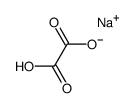
1186-49-8 |
| Literature: Gmelin Handbook: Na: MVol., 307, page 846 - 848 |
|
~% 
1186-49-8 |
| Literature: Gmelin Handbook: Na: MVol., 43.4, page 175 - 177 Full Text Show Details Margueritte Patent: EP159 , 1855 ; Full Text Show Details Samuel Patent: EP7873 , 1838 ; Full Text Show Details Weldon Patent: EP629 , 1866 ; |
|
~% 
1186-49-8 |
| Literature: Bohlig Dinglers Polytech. J., 1877 , vol. 224, p. 621 - 621 Full Text Show Details Gmelin Handbook: Na: MVol., 255.1, page 711 - 713 |
|
~% 
1186-49-8 |
| Literature: Souchay; Lenssen Liebigs Annalen der Chemie, 1856 , vol. 99, p. 34 - 34 Full Text Show Details Gmelin Handbook: Na: MVol., 308, page 848 - 850 |
| Precursor 6 | |
|---|---|
| DownStream 3 | |
| HS Code | 2915900090 |
|---|---|
| Summary | 2915900090 other saturated acyclic monocarboxylic acids and their anhydrides, halides, peroxides and peroxyacids; their halogenated, sulphonated, nitrated or nitrosated derivatives VAT:17.0% Tax rebate rate:9.0% Supervision conditions:AB(certificate of inspection for goods inward,certificate of inspection for goods outward) MFN tariff:5.5% General tariff:30.0% |
